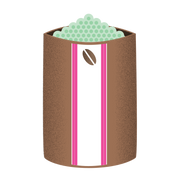Quarter Horse Coffee Club
Exclusive coffees for ✛ Plus plan subscribers

Coffee Profile

Varietals
Red Bourbon

Process
Washed

Producer
Gitega Hills Washing Station

Notes
Vanilla, Dates & Maple Syrup
More about the coffee, producer & region.
Gitega Hills Washing Station is owned and operated by Rwandan local producer Bernard Uwitije in southern Rwanda. The Gitega Hills Washing Station was the first of three stations acquired by Bernard’s company in 2016 and produces 450 tonnes of green beans each harvest that are supplied by hundreds of local small coffee farmers. Bernard recognises the needs for those in his community and so he puts efforts towards improving those areas through his business. They provide monthly training to farmers in agricultural practices and coffee seedlings to help start those new to the coffee farming industry. Trapro works with all farmers in the community but focuses on women and youth who were unable to complete higher education, as a way of boosting the community from a sustainable long-term vision.



About the Region
Just 12km from neighbouring Bwenda in the Cyanika sector and slightly higher up, adjacent to a disused quartz quarry, sits Gitega Hills. Slightly larger than Bwenda, Gitega covers an area of around 6 hectares and is nearby the small town of Miko. Gitega is the name of the surrounding land cell. A cell being a smaller area within a larger sector, within a larger region or province. Everyone who works at Gitega is from the local community and the station plays a valuable and positive role in the area for the work it provides.
About the Process
Good rainfall the area experienced during the harvest pointed to great quality for the 2022 season’s yields. Gitega employs 150 people including 11 permanently, with the rest being seasonal workers. 90% are women. 1040 farmers contribute cherry to Gitega’s annual production and in 2016 they processed 400 tons of cherry. At the time of our visit they had already hit 500 tons with the expectation to hit 700 before they stopped processing for the season. The farms all lie between 0.5km and 7km away and are serviced by 33 different cherry collection points. On average the contributing farms grow just 400 trees (1 hectare). Additionally, the station provides farmers with organic EM2 compost which consists of recycled cherry pulp from the station with some animal manure.
How can I get this coffee?
Available exclusively in February 2023 on our ✛ Plus QHC Club Membership
Join our QHC Club today...








